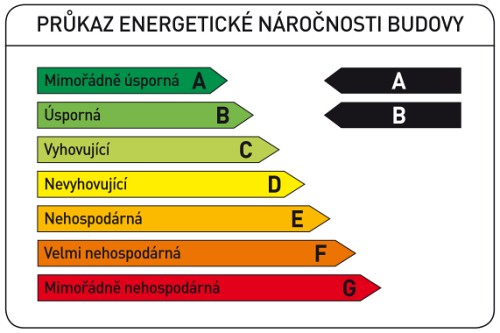
Click the picture for an older (2010) TRF article on EU bans of heated houses.
President vetoed a bill on energy performance of buildings
Dear Ms Spokeswoman of the House,
I am using the competencies given to me by the article 50 of the Czech Republic's Constitution and I am returning the July 19th, 2012 bill, amending the bill 406/2000 of the collection about the energy management, in the wording of the later directives, to the lower chamber of the Parliament. The bill has been received by my office on July 27th, 2012.
The main goal of the bill is to force investors and landlords to build new buildings and to reconstruct older houses and buildings in such a way for them to have the minimum possible, according to the terminology of the bill even "almost zero consumption of energy" (this phrase is contained e.g. in paragraph 2 of paragraph 1 under letter w, in paragraph 5 of paragraph 4 under letter a, or paragraph 7 of paragraph 1 under letter c of the updated bill as well as in the justifying report attached to the bill). Based on the unrealistic and accurately undefined terminology, construction companies and developers are required to do lots of additional work that may be legally enforced.

Stickers, Certificate of the building's energy performance: ABCDEFG: unusually efficient, efficient, tolerable, intolerable, inefficient, very inefficient, extraordinarily inefficient.
In the context of these requirements, the bill introduces mandatory energy certificates for individual building [see above], the duty to work out and submit receipts about the energy requirements by the buildings and individual apartments when they're sold, constructed, or reconstructed as well as mandatory inspections of kettles, electrical grids, and air-conditioning systems, and those things must be done every 5 years. The bill also introduces assorted energy audits and expert assessments which also requires to establish new jobs for energy specialists which would create a new administrative burden for the users of the bill as well as the state.
The amendment of the bill about the energy management contains an implementation of the 2010/31/EU directive of the European Union that has replaced the older directive of the European Parliament and the Council, 2002/91/EC, from December 16th, 2002 about the energy performance of buildings. At the same moment, the amendment alters the conditions of the energy efficiency of buildings in the context of "renewable" sources of energy that have already been incorporated into a previous amendment of the bill No. 406/2000 of the Collection and that followed from the content of a previous directive 2009/28/EC.
The EU and Council's directive about the increasing energy efficiency of buildings may be interpreted as a result of a flawed long-held policy of unreasonable commitments that the EU and its member states have been adopting for years and that is fortunately being gradually abandoned these days. Its application would significantly increase the price of construction of not only new public buildings but even private houses and apartments. That would create a new burden for the budgets of states, regions, towns, as well as individual households and it would also make the living more expensive, complicate the purchases of apartments, and create an overall liability for the real estate market. Because the bill introduces a system of the public support for the private sector, especially for companies that would be hired to install the selected devices that are using "renewable" sources of energy and that would perform state-sponsored audits, the only interest groups that would benefit from the bill would be the companies doing business with technologies that would be impossible to sell under normal market conditions as well as those who will order and verify the audits of the energy efficiency. Everyone else will lose.
The change of the 2010 directive not only forces member states to thermally insulate public buildings that are being reconstructed; it even forces them to perform the reconstruction itself even if it were unnecessary under normal circumstances. According to the analysis by the Czech Industry Ministry, that would cost USD 0.5-1.5 billion just in our country.
And that's not the only thing; the directive also forces private subjects to thermally insulate buildings. This logic indicates that the state and the EU consider themselves to be more knowledgeable than the landlords when it comes to the question what is actually good for the landlords' houses. In this sense, the bill implicitly says that it's not up to the landlords' careful thinking to decide whether they want to spend their money for energy or various types of thermal insulation.

Barbora Špotáková wins the second Czech Olympic gold, improving the medal tally to 2-3-3. Each of five of her six javelin throws would have been enough for gold!
However, the Czech bill is going even beyond the procedures required by the EU. For example, it ignores the local climate conditions or the activities that the buildings are used for. For those reasons, I was urged to veto this bill not only by individual citizens and their groups but also the senate clubs of the Social Democratic Party, Civic Democratic Party, and the Christian Democratic Union - Czechoslovak People's Party. In the senate, the amendment only passed by one vote.
By its conception and purpose, this bill belongs among the worst and most harmful bills for a free society that ever appeared on my table during my job as the Czech president. It is surprising that this bill was proposed by this [center-right] government.
I am convinced that the reasons that lead me to return this bill are sufficiently compelling for the lower chamber of the Parliament to discuss it once again and more responsibly.
With greetings,
Václav Klaus
No comments:
Post a Comment